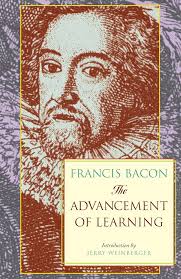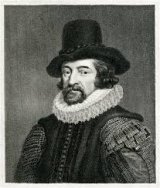The Advancement of Learning Page #21
The Advancement of Learning, published by Francis Bacon in 1605, is a foundational text in the history of science and philosophy. In this work, Bacon advocates for empirical research and the systematic organization of knowledge, laying the groundwork for the scientific method. The book critiques existing scholarly practices and proposes a new approach to learning based on observation and experimentation. It marks a significant shift towards modern scientific inquiry.
- Year:
- 1605
- 1,168 Views
Submitted by acronimous on August 11, 2024
Modified by acronimous on August 11, 2024
education collegiate which is free, where such as were so disposed might give themselves in histories, modern languages, books of policy and civil discourse, and other the like enablements unto service of estate. 9. And because founders of colleges do plant, and founders of lectures do water, it followeth well in order to speak of the defect which is in public lectures; namely, in the smallness, and meanness of the salary or reward which in most places is assigned unto them, whether they be lectures of arts, or of professions. For it is necessary to the progression of sciences that readers be of the most able and sufficient men; as those which are ordained for generating and propagating of sciences, and not for transitory use. This cannot be, except their condition and endowment be such as may content the ablest man to appropriate his whole labour and continue his whole age in that function and attendance; and therefore must have a proportion answerable to that mediocrity or competency of advancement, which may be expected from a profession or the practice of a profession. So as, if you will have sciences flourish, you must observe David’s military law, which was, “That those which stayed with the carriage should have equal part with those which were in the action;” else will the carriages be ill attended. So readers in sciences are indeed the guardians of the stores and provisions of sciences, whence men in active courses are furnished, and therefore ought to have equal entertainment with them; otherwise if the fathers in sciences be of the weakest sort or be ill maintained, “Et patrum invalidi referent jejunia nati.” 10. Another defect I note, wherein I shall need some alchemist to help me, who call upon men to sell their books, and to build furnaces; quitting and forsaking Minerva and the Muses as barren virgins, and relying upon Vulcan. But certain it is, that unto the deep, fruitful, and operative study of many sciences, specialty natural philosophy and physic, books be not only the instrumentals; wherein also the beneficence of men hath not been altogether wanting. For we see spheres, globes, astrolabes, maps, and the like, have been provided as appurtenances to astronomy and cosmography, as well as books. We see likewise that some places instituted for physic have annexed the commodity of gardens for simples of all sorts, and do likewise command the use of dead bodies for anatomies. But these do respect but a few things. In general, there will hardly be any main proficience in the disclosing of nature, except there be some allowance for expenses about experiments; whether they be experiments appertaining to Vulcanus or Dædalus, furnace or engine, or any other kind. And therefore as secretaries and spials of princes and states bring in bills for intelligence, so you must allow the spials and intelligencers of nature to bring in their bills; or else you shall be ill advertised. 11. And if Alexander made such a liberal assignation to Aristotle of treasure for the allowance of hunters, fowlers, fishers, and the like, that he might compile a history of nature, much better do they deserve it that travail in arts of nature. 12. Another defect which I note is an intermission or neglect in those which are governors in universities, of consultation, and in princes or superior persons, of visitation: to enter into account and consideration, whether the readings, exercises, and other customs appertaining unto learning, anciently begun and since continued, be well instituted or no; and thereupon to ground an amendment or reformation in that which shall be found inconvenient. For it is one of your Majesty’s own most wise and princely maxims, “That in all usages and precedents, the times be considered wherein they first began; which if they were weak or ignorant, it derogateth from the authority of the usage, and leaveth it for suspect.” And therefore inasmuch as most of the usages and orders of the universities were derived from more obscure times, it is the more requisite they be re-examined. In this kind I will give an instance or two, for example sake, of things that are the most obvious and familiar. The one is a matter, which though it be ancient and general, yet I hold to be an error; which is, that scholars in universities come too soon and too unripe to logic and rhetoric, arts fitter for graduates than children and novices. For these two, rightly taken, are the gravest of sciences, being the arts of arts; the one for judgment, the other for ornament. And they be the rules and directions how to set forth and dispose matter: and therefore for minds empty and unfraught with matter, and which have not gathered that which Cicero calleth sylva and supellex, stuff and variety, to begin with those arts (as if one should learn to weigh, or to measure, or to paint the wind) doth work but this effect, that the wisdom of those arts, which is great and universal, is almost made contemptible, and is degenerate into childish sophistry and ridiculous affectation. And further, the untimely learning of them hath drawn on by consequence the superficial and unprofitable teaching and writing of them, as fitteth indeed to the capacity of children. Another is a lack I find in the exercises used in the universities, which do snake too great a divorce between invention and memory. For their speeches are either premeditate, in verbis conceptis, where nothing is left to invention, or merely extemporal, where little is left to memory. Whereas in life and action there is least use of either of these, but rather of intermixtures of premeditation and invention, notes and memory. So as the exercise fitteth not the practice, nor the image the life; and it is ever a true rule in exercises, that they be framed as near as may be to the life of practice; for otherwise they do pervert the motions and faculties of the mind, and not prepare them. The truth whereof is not obscure, when scholars come to the practices of professions, or other actions of civil life; which when they set into, this want is soon found by themselves, and sooner by others. But this part, touching the amendment of the institutions and orders of universities, I will conclude with the clause of Cæsar’s letter to Oppius and Balbes, Hoc quemadmodum fieri possit, nonnulla mihi in mentem veniunt, et multa reperiri possunt: de iis rebus rgo vos ut cogitationem suscipiatis. 13. Another defect which I note ascendeth a little higher than the precedent. For as the proficience of learning consisteth much in the orders and institutions of universities in the same states and kingdoms, so it would be yet more advanced, if there were more intelligence mutual between the universities of Europe than now there is. We see there be many orders and foundations, which though they be divided under several
Translation
Translate and read this book in other languages:
Select another language:
- - Select -
- 简体中文 (Chinese - Simplified)
- 繁體中文 (Chinese - Traditional)
- Español (Spanish)
- Esperanto (Esperanto)
- 日本語 (Japanese)
- Português (Portuguese)
- Deutsch (German)
- العربية (Arabic)
- Français (French)
- Русский (Russian)
- ಕನ್ನಡ (Kannada)
- 한국어 (Korean)
- עברית (Hebrew)
- Gaeilge (Irish)
- Українська (Ukrainian)
- اردو (Urdu)
- Magyar (Hungarian)
- मानक हिन्दी (Hindi)
- Indonesia (Indonesian)
- Italiano (Italian)
- தமிழ் (Tamil)
- Türkçe (Turkish)
- తెలుగు (Telugu)
- ภาษาไทย (Thai)
- Tiếng Việt (Vietnamese)
- Čeština (Czech)
- Polski (Polish)
- Bahasa Indonesia (Indonesian)
- Românește (Romanian)
- Nederlands (Dutch)
- Ελληνικά (Greek)
- Latinum (Latin)
- Svenska (Swedish)
- Dansk (Danish)
- Suomi (Finnish)
- فارسی (Persian)
- ייִדיש (Yiddish)
- հայերեն (Armenian)
- Norsk (Norwegian)
- English (English)
Citation
Use the citation below to add this book to your bibliography:
Style:MLAChicagoAPA
"The Advancement of Learning Books." Literature.com. STANDS4 LLC, 2025. Web. 9 Mar. 2025. <https://www.literature.com/book/the_advancement_of_learning_3165>.








Discuss this The Advancement of Learning book with the community:
Report Comment
We're doing our best to make sure our content is useful, accurate and safe.
If by any chance you spot an inappropriate comment while navigating through our website please use this form to let us know, and we'll take care of it shortly.
Attachment
You need to be logged in to favorite.
Log In